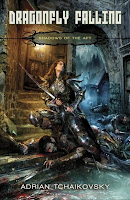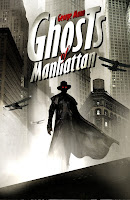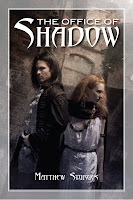From here to Eternity, or just August 2010…
October 2009:
Joel Shepherd, Sasha: A Trial of  Blood & Steel, Trade Paperback, Epic Fantasy
Blood & Steel, Trade Paperback, Epic Fantasy
James Enge, A Crooked Way, Trade Paperback, Swords & Sorcery
James Barclay, Noonshade (Chronicles of the Raven 2) Trade Paperback, Epic Fantasy
November 2009:
Mark Chadbourn, The Silver Skull (Swords of Albion), Trade Paperback, Historical Fantasy/Secret History
Kristine Kathryn Rusch, Diving into the Wreck, Trade Paperback, Space Opera
James Barclay, Nightchild (Chronicles of the Raven 3), Trade Paperback, Epic Fantasy
December 2009:
Mike Resnick, Starship: Flagship (Book 5), Hardcover, Military SF
January 2010:
Kay Kenyon, City Without End (The Entire and the Rose 3), Trade Paperback after Hardcover, Sci-fantasy, Epic SF
Kay Kenyon, Prince of Storms (The Entire and the Rose 4), Hardcover, Sci-fantasy, Epic SF
February 2010:
David Louis Edelman, Geosynchron (Jump 225 Vol III), Trade Paperback, SF
March 2010:
Adrian Tchaikovsky, Empire in Black and Gold (Shadows of the Apt 1), Trade Paperback, Epic Fantasy
Joel Shepherd, Petrodor: A Trial of Blood & Steel II, Trade Paperback, Epic Fantasy
Paul McAuley, Gardens of the Sun, Trade Paperback, Space Opera
April 2010:
George Mann, Ghosts of Manhattan, Trade Paperback, 1920s Steampunk Superhero
Adrian Tchaikovsky, Dragonfly Falling (Shadows of the Apt 2), Trade Paperback, Epic Fantasy
Ian McDonald, Ares Express, Trade Paperback, SF
May 2010:
Mark Chadbourn, The Devil in Green (Dark Age Book 1), Trade Paperback, Urban/Contemporary Fantasy
Adrian Tchaikovsky, Blood of the Mantis (Shadows of the Apt 3), Trade Paperback, Epic Fantasy
June 2010:
Mark Chadbourn, The Queen of Sinister (Dark Age Book 2), Trade Paperback, Urban/Contemporary Fantasy
Matthew Sturges, The Office of Shadow, Trade Paperback, Epic Fantasy

Jon Sprunk, Shadow’s Son, Trade Paperback, Swords & Sorcery
July 2010:
Mark Chadbourn, The Hounds of Avalon (Dark Age Book 3), Trade Paperback, Epic Fantasy
Ian McDonald, The Dervish House, Hardcover, SF
August 2010:
Kay Kenyon, Prince of Storms (The Entire and the Rose 4) Trade Paperback after Hardcover, Sci-fantasy, Epic SF
Tom Lloyd, The Ragged Man, (The Twilight Reign Book 4), Trade Paperback, Epic Fantasy
Note: The Spring-Summer 2010 season (which begins March 2010) is already up at Amazon, and should be available for preorders at BooksAMillion, Borders, B&N, and your favorite independent bookstore too as soon as the information filters on through.










